Abstract
A review is given of the metabolism of fructose in the mammalian organism, and its significance in medicine. Emphasis is laid upon the absorption and assimilation of fructose through pathways not identical with those of glucose. The metabolism of fructose is largely insulin-independent, although the ultimate fate of fructose carbons is determined by the presence or the absence of insulin.
Clinical and experimental work has suggested that fructose may exert beneficial effects as a component of the diet for patients with mild and well-balanced diabetes. Fructose is absorbed slowly from the gut, and does not induce drastic changes in blood sugar levels. Secondly, fructose is metabolized by insulin-independent pathways in the liver, intestinal wall, kidney and adipose tissue.
As a consequence of the rapid and efficient utilization of fructose, it has been used widely for intravenous feeding in medicine and surgery. However, it has been shown that the rapid infusion of large amounts of fruetose may cause accumulation of lactic acid in the extracellular fluid. The possibility of lactate acidosis, with concomitant impairment of the acid-base balance, already disturbed, constitutes a relative contraindication to the use of intravenous fructose in the treatment of diabetic ketoacidosis.
Fructose is known to accelerate ethanol metabolism in the liver. No well-documented reports on the use of fructose in the treatment of ethanol intoxication have been published, although it has recently been suggested that fructose might be of value in the treatment of delirium tremens.
Fructose may be less cariogenic than sucrose, at least in short-term experiments. Long-term trials are lacking, and thus the potential advantages of fructose in preventive odontology have not been determined.
Fructose does not seem to have any side-effects when used in reasonable amounts. However, it has been reported that the administration of fructose in large amounts induces hyperlipidemia both in man and in experimental animals. Earlier suggestions concerned with the atherogenic properties of fructose have recently been challenged. The apparent increase in the incidence of coronary disease among sucrose users seems to be a statistical artefact, caused by the increased ingestion of coffee and soft drinks by cigarette smokers.
Full text
PDF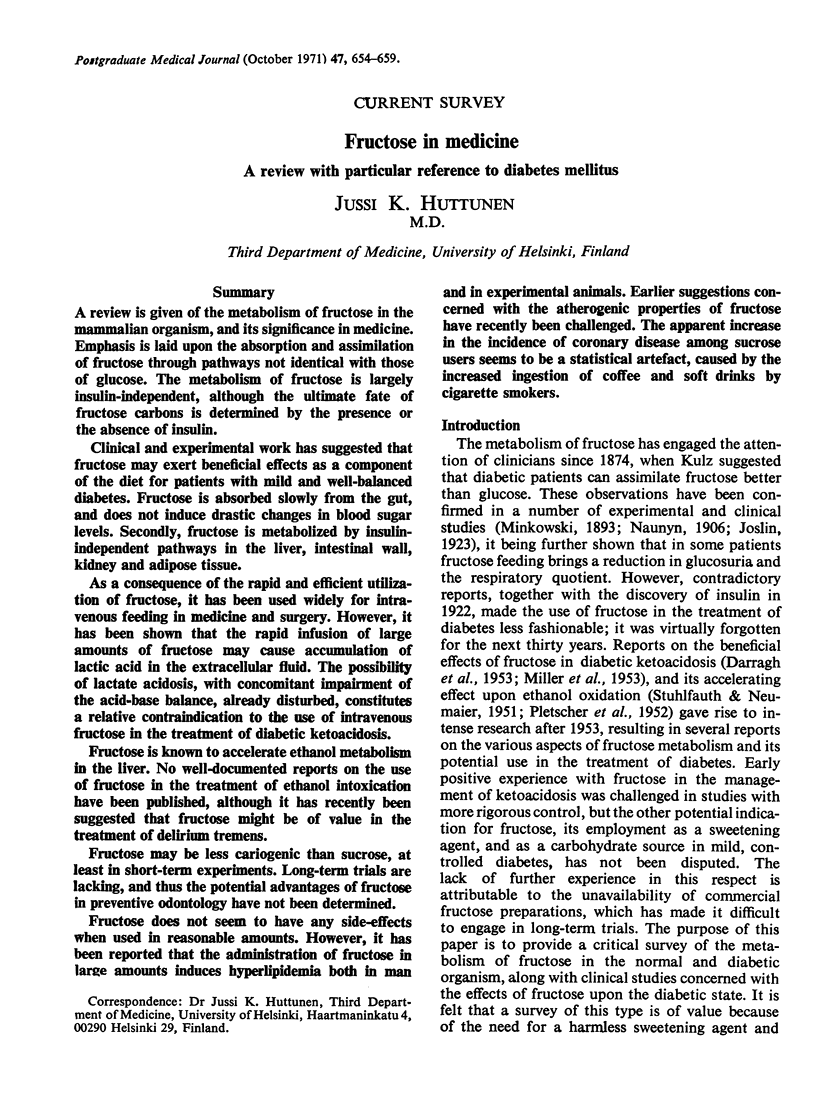
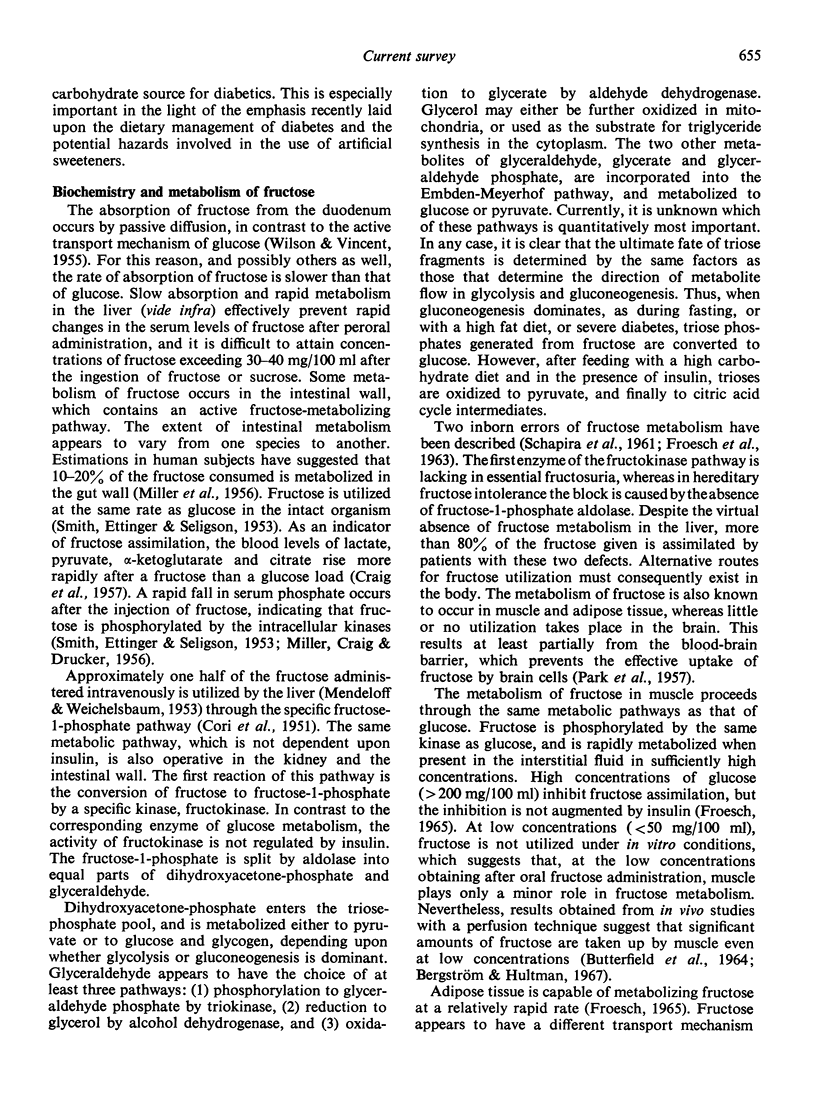
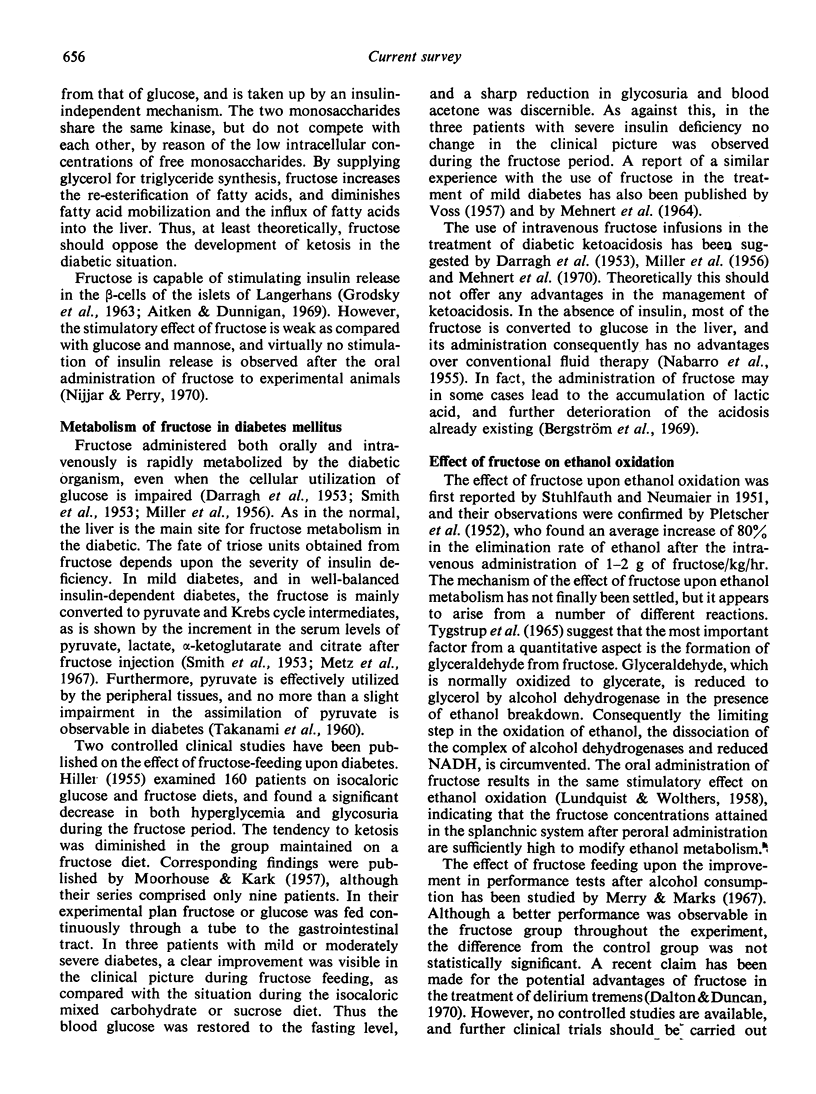
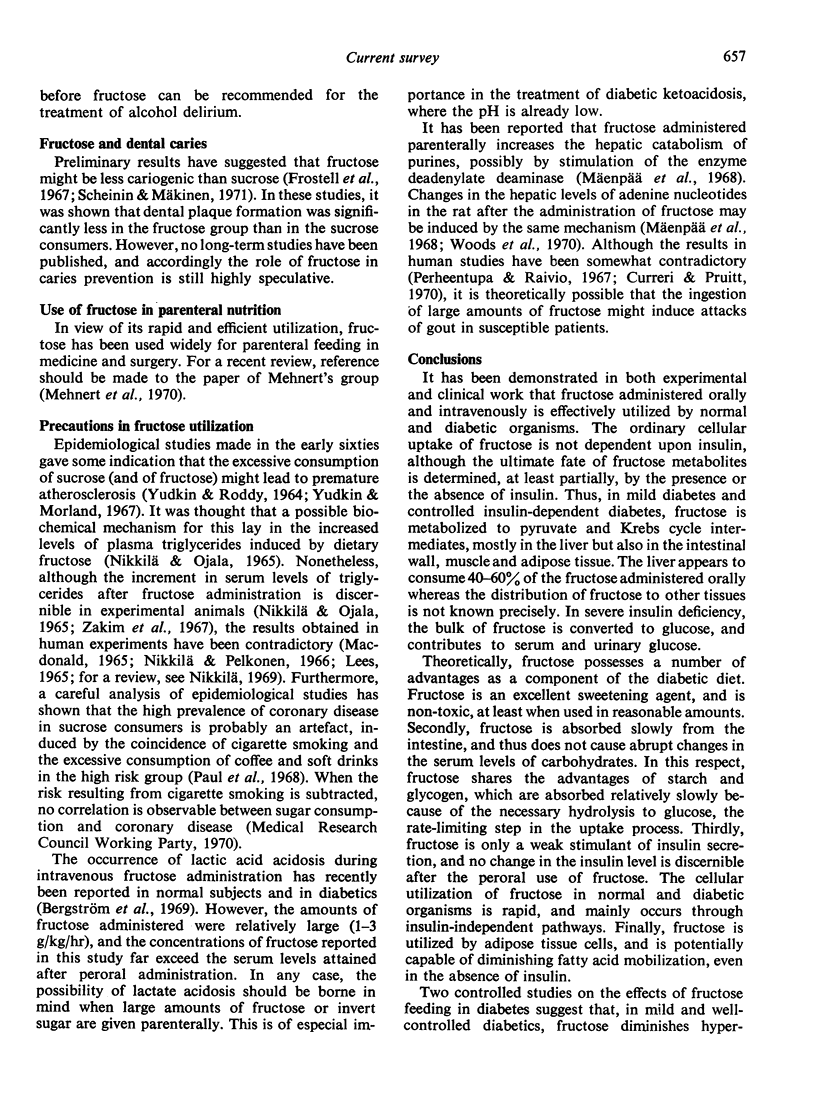
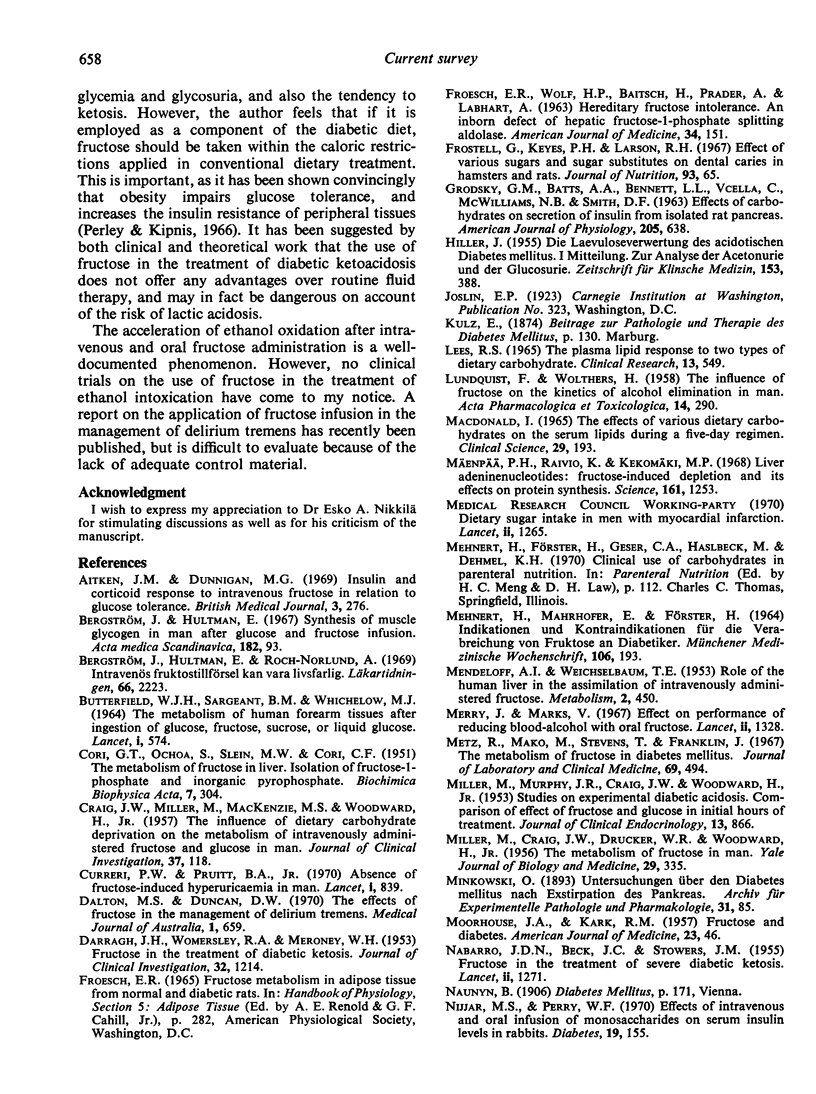
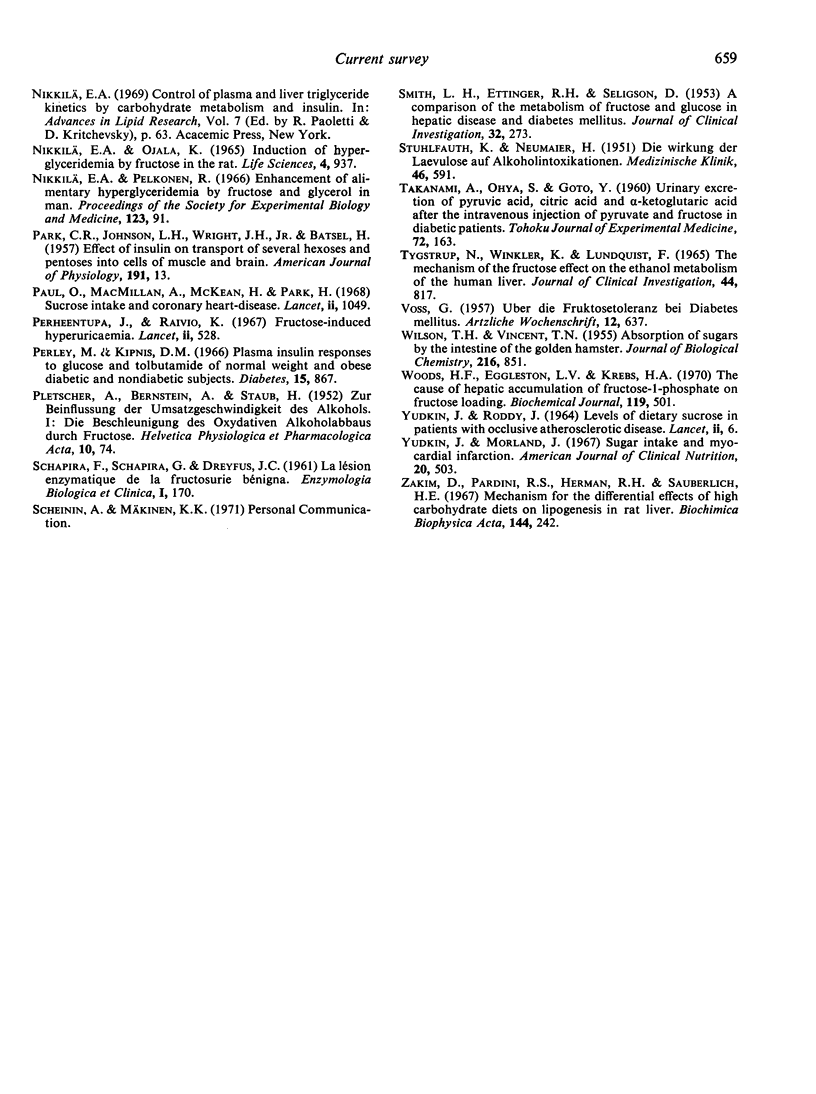
Selected References
These references are in PubMed. This may not be the complete list of references from this article.
- Aitken J. M., Dunnigan M. G. Insulin and corticoid response to intravenous fructose in relation to glucose tolerance. Br Med J. 1969 Aug 2;3(5665):276–277. doi: 10.1136/bmj.3.5665.276. [DOI] [PMC free article] [PubMed] [Google Scholar]
- BUTTERFIELD W. J., SARGEANT B. M., WHICHELOW M. J. THE METABOLISM OF HUMAN FOREARM TISSUES AFTER INGESTION OF GLUCOSE, FRUCTOSE, SUCROSE, OR LIQUID GLUCOSE. A STUDY BY CONTINUOUS IN-VIVO AUTOANALYSIS. Lancet. 1964 Mar 14;1(7333):574–577. doi: 10.1016/s0140-6736(64)91328-5. [DOI] [PubMed] [Google Scholar]
- Bergström J., Hultman E., Roch-Norlund A. Intravenös fruktostillförsel kan vara livsfarlig. Lakartidningen. 1969 May 21;66(21):2223–2229. [PubMed] [Google Scholar]
- CORI G. T., OCHOA S., SLEIN M. W., CORI C. F. The metabolism of fructose in liver; isolation of fructose-I-phosphate and inorganic pyrophosphate. Biochim Biophys Acta. 1951 Jul;7(2):304–317. doi: 10.1016/0006-3002(51)90032-7. [DOI] [PubMed] [Google Scholar]
- CRAIG J. W., MILLER M., MACKENZIE M. S., WOODWARD H., Jr The influence of dietary carbohydrate deprivation on the metabolism of intravenously administered fructose and glucose in man. J Clin Invest. 1958 Jan;37(1):118–126. doi: 10.1172/JCI103578. [DOI] [PMC free article] [PubMed] [Google Scholar]
- Curreri P. W., Pruitt B. A., Jr Absence of fructose-induced hyperuricaemia in men. Lancet. 1970 Apr 18;1(7651):839–839. doi: 10.1016/s0140-6736(70)92436-0. [DOI] [PubMed] [Google Scholar]
- DARRAGH J. H., WOMERSLEY R. A., MERONEY W. H. Fructose in the treatment of diabetic ketosis. J Clin Invest. 1953 Dec;32(12):1214–1221. doi: 10.1172/JCI102848. [DOI] [PMC free article] [PubMed] [Google Scholar]
- Dalton M. S., Duncan D. W. The effects of fructose in the management of delirium tremens. Med J Aust. 1970 Mar 28;1(13):659–661. [PubMed] [Google Scholar]
- FROESCH E. R., WOLF H. P., BAITSCH H., PRADER A., LABHART A. Hereditary fructose intolerance. An inborn defect of hepatic fructose-1-phosphate splitting aldolase. Am J Med. 1963 Feb;34:151–167. doi: 10.1016/0002-9343(63)90050-0. [DOI] [PubMed] [Google Scholar]
- Frostell G., Keyes P. H., Larson R. H. Effect of various sugars and sugar substitutes on dental caries in hamsters and rats. J Nutr. 1967 Sep;93(1):65–76. doi: 10.1093/jn/93.1.65. [DOI] [PubMed] [Google Scholar]
- GRODSKY G. M., BATTS A. A., BENNETT L. L., VCELLA C., MCWILLIAMS N. B., SMITH D. F. EFFECTS OF CARBOHYDRATES ON SECRETION OF INSULIN FROM ISOLATED RAT PANCREAS. Am J Physiol. 1963 Oct;205:638–644. doi: 10.1152/ajplegacy.1963.205.4.638. [DOI] [PubMed] [Google Scholar]
- HILLER J. Die Lävuloseverwertung des acidotischen Diabetes mellitus. I. Zur Analyse der Acetonurie und der Glucosurie. Z Klin Med. 1955;153(4):388–396. [PubMed] [Google Scholar]
- LUNDQUIST F., WOLTHERS H. The influence of fructose on the kinetics of alcohol elimination in man. Acta Pharmacol Toxicol (Copenh) 1958;14(3):290–294. doi: 10.1111/j.1600-0773.1958.tb01165.x. [DOI] [PubMed] [Google Scholar]
- MEHNERT H., MAHRHOFER E., FOERSTER H. INDIKATIONEN UND KONTRAINDIKATIONEN FUER DIE VERABREICHUNG VON FRUKTOSE AN DIABETIKER. Munch Med Wochenschr. 1964 Jan 31;106:193–198. [PubMed] [Google Scholar]
- MENDELOFF A. I., WEICHSELBAUM T. E. Role of the human liver in the assimilation of intravenously administered fructose. Metabolism. 1953 Sep;2(5):450–458. [PubMed] [Google Scholar]
- MILLER M., CRAIG J. W., DRUCKER W. R., WOODWARD H., Jr The metabolism of fructose in man. Yale J Biol Med. 1956 Dec;29(3):335–360. [PMC free article] [PubMed] [Google Scholar]
- MOORHOUSE J. A., KARK R. M. Fructose and diabetes. Am J Med. 1957 Jul;23(1):46–58. doi: 10.1016/0002-9343(57)90357-1. [DOI] [PubMed] [Google Scholar]
- Macdonald I. The effects of various dietary carbohydrates on the serum lipids during a five-day regimen. Clin Sci. 1965 Aug;29(1):193–197. [PubMed] [Google Scholar]
- Merry J., Marks V. effect on performance of reducing blood-alcohol with oral fructose. Lancet. 1967 Dec 23;2(7530):1328–1330. doi: 10.1016/s0140-6736(67)90913-0. [DOI] [PubMed] [Google Scholar]
- Metz R., Mako M., Stevens T., Franklin J. The metabolism of fructose in diabetes mellitus. J Lab Clin Med. 1967 Mar;69(3):494–503. [PubMed] [Google Scholar]
- Mäenpä P. H., Raivio K. O., Kekomäki M. P. Liver adenine nucleotides: fructose-induced depletion and its effect on protein synthesis. Science. 1968 Sep 20;161(3847):1253–1254. doi: 10.1126/science.161.3847.1253. [DOI] [PubMed] [Google Scholar]
- NABARRO J. D., BECK J. C., STOWERS J. M. Fructose in the treatment of severe diabetic ketosis. Lancet. 1955 Dec 17;269(6903):1271–1274. doi: 10.1016/s0140-6736(55)93056-7. [DOI] [PubMed] [Google Scholar]
- Nijjar M. S., Perry W. F. Effects of intravenous and oral infusion of monosaccharides on serum insulin levels in rabbits. Diabetes. 1970 Mar;19(3):155–160. doi: 10.2337/diab.19.3.155. [DOI] [PubMed] [Google Scholar]
- Nikkilä E. A., Ojala K. Induction of hyperglyceridemia by fructose in the rat. Life Sci. 1965 May;4(9):937–943. doi: 10.1016/0024-3205(65)90193-1. [DOI] [PubMed] [Google Scholar]
- PARK C. R., JOHNSON L. H., WRIGHT J. H., Jr, BATSEL H. Effect of insulin on transport of several hexoses and pentoses into cells of muscle and brain. Am J Physiol. 1957 Oct;191(1):13–18. doi: 10.1152/ajplegacy.1957.191.1.13. [DOI] [PubMed] [Google Scholar]
- PLETSCHER A., BERNSTEIN A., STAUB H. Zur Beeinflussung der Umsatzgeschwindigkeit des Alkohols. I. Die Beschleunigung des oxydativen Alkoholabbaus durch Fructose. Helv Physiol Pharmacol Acta. 1952;10(1):74–83. [PubMed] [Google Scholar]
- Paul O., MacMillan A., McKean H., Park H. Sucrose intake and coronary heart-disease. Lancet. 1968 Nov 16;2(7577):1049–1051. doi: 10.1016/s0140-6736(68)91526-2. [DOI] [PubMed] [Google Scholar]
- Perheentupa J., Raivio K. Fructose-induced hyperuricaemia. Lancet. 1967 Sep 9;2(7515):528–531. doi: 10.1016/s0140-6736(67)90494-1. [DOI] [PubMed] [Google Scholar]
- Perley M., Kipnis D. M. Plasma insulin responses to glucose and tolbutamide of normal weight and obese diabetic and nondiabetic subjects. Diabetes. 1966 Dec;15(12):867–874. doi: 10.2337/diab.15.12.867. [DOI] [PubMed] [Google Scholar]
- SCHAPIRA F., SCHAPIRA G., DREYFUS J. C. [The enzymatic defect of benign fructosuria]. Enzymol Biol Clin (Basel) 1961;1:170–175. [PubMed] [Google Scholar]
- SMITH L. H., Jr, ETTINGER R. H., SELIGSON D. A comparison of the metabolism of fructose and glucose in hepatic disease and diabetes mellitus. J Clin Invest. 1953 Apr;32(4):273–282. doi: 10.1172/JCI102736. [DOI] [PMC free article] [PubMed] [Google Scholar]
- STUHLFAUTH K., NEUMAIER H. Die Wirkung der Laevulose auf Alkoholintoxikationen. Med Klin. 1951 May 18;46(20):591–593. [PubMed] [Google Scholar]
- TAKANAMI A., OHYA S., GOTO Y. Urinary excretion of pyruvic acid, citric acid and alpha-ketoglutaric acid after the intravenous injection of pyruvate and fructose in diabetic patients. Tohoku J Exp Med. 1960 Sep 25;72:163–168. doi: 10.1620/tjem.72.163. [DOI] [PubMed] [Google Scholar]
- TYGSTRUP N., WINKLER K., LUNDQUIST F. THE MECHANISM OF THE FRUCTOSE EFFECT ON THE ETHANOL METABOLISM OF THE HUMAN LIVER. J Clin Invest. 1965 May;44:817–830. doi: 10.1172/JCI105194. [DOI] [PMC free article] [PubMed] [Google Scholar]
- VOSS G. Uber die Fructosetoleranz bei Diabetes mellitus. Arztl Wochensch. 1957 Jul 19;12(29):637–640. [PubMed] [Google Scholar]
- WILSON T. H., VINCENT T. N. Absorption of sugars in vitro by the intestine of the golden hamster. J Biol Chem. 1955 Oct;216(2):851–866. [PubMed] [Google Scholar]
- Woods H. F., Eggleston L. V., Krebs H. A. The cause of hepatic accumulation of fructose 1-phosphate on fructose loading. Biochem J. 1970 Sep;119(3):501–510. doi: 10.1042/bj1190501. [DOI] [PMC free article] [PubMed] [Google Scholar]
- YUDKIN J., RODDY J. LEVELS OF DIETARY SUCROSE IN PATIENTS WITH OCCLUSIVE ATHEROSCLEROTIC DISEASE. Lancet. 1964 Jul 4;2(7349):6–8. doi: 10.1016/s0140-6736(64)90003-0. [DOI] [PubMed] [Google Scholar]
- Yudin J., Morland J. Sugar intake and myocardial infarction. Am J Clin Nutr. 1967 May;20(5):503–506. doi: 10.1093/ajcn/20.5.503. [DOI] [PubMed] [Google Scholar]
- Zakim D., Pardini R. S., Herman R. H., Sauberlich H. E. Mechanism for the differential effects of high carbohydrate diets on lipogenesis in rat liver. Biochim Biophys Acta. 1967 Oct 2;144(2):242–251. doi: 10.1016/0005-2760(67)90154-3. [DOI] [PubMed] [Google Scholar]


